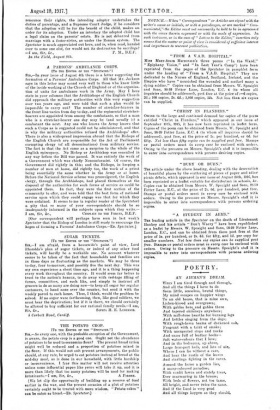A PARSONS' AMBULANCE CORPS.
(To sac EDITOR or me "Seremon."1 Sns,—In your issue of August 4th there is a letter suggesting the formation of a Parsons' Ambulance Corps. All that Mr. Jackson says in this letter may sound very well to those who know little of the inside working of the Church of England or of the organiza- tion of units for ambulance work in the Army. May I here state in your columns that the Archbishops of the English Church did approach the military authorities with this very suggestion seer two years ago, and were told that such a plan would be impossible to carry out? The number of stretcher-bearers in the front line varies from day to day, and the regimental stretcher- bearers are appointed from among the combatants, so that a man who is a stretcher-bearer one day may be (and usually is) a combatant the nest. Any one who knows the Army knows that such a Corps as is suggested could not be administered, and that is why the military authorities refused the Archbishops' offer. There is also a widespread impression abroad that the Bishops of the English Church are responsible for the Act of Parliament exempting clergy (of n11 denominations) from military service. The fact is that the Act came as a surprise to the whole of the English episcopacy. No Bishop or Archbishop was consulted in any way before the Bill was passed. It was entirely the work of a Government which was chiefly Nonconformist. Of course, the Government did rightly in this; and the Bishops, in keeping a number of men at home, did rightly too, the work of a priest being essentially the same whether in the Army or at home. Before the National Service scheme was promulgated, the English clergy, through the Archbishops, had placed themselves at the disposal of the authorities for such forms of service as could be appointed them. In fact, they were the first section of the community to offer, and were told that the best form of national service upon which they could engage was that for which they were ordained. It seems to me (a regular reader of the Spectator) a pity that so many of your correspondents should be so inadequately informed in the subjects upon which they write.— I am, Sir, he., CHAPLAIN TO THE Ponces, D.E.P. [Our correspondent will perhaps have seen in last week's Spectator that the Bishop of London is still ready to encourage the hopes of forming a Parsons' Ambulance Corps.—En. Spectator.]


























 Previous page
Previous page